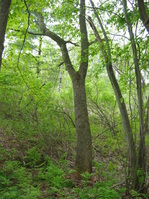
It was not the wisest $100 I spent.
After 10 minutes of basic breathing, the therapist asked how I had been. I gave her a brief summary of the past two months, including the previous night's dinner appearance. She listened intently, offered a few more breathing exercises, and then said, matter-of-factly, "You know, you may be having a nervous breakdown."
She offered to write down the names of several psychiatrists in the area. I explained that I lived in Boston, where there was no shortage of psychiatrists (or the people who need them). I then thanked her for her 25-minute diagnosis and got the hell out of dodge.
As I opened the door to go outside, I said out loud "I am not going crazy." Walking down the road, I reminded myself that just because you don't know what's happening to you doesn't mean you're crazy. It just means. You don't know. You know?
Aimlessly, I crisscrossed the road that winds down to Kripalu's main entrance. Except it wasn't aimless. I was being pulled to my journey's next destination. The way a horseshoe magnet pulls iron. Deliberately. Persistently.
Pulled until I found myself standing at the entrance to the most ordinary of paths. The kind that wild animals frequent, but tamed humans ignore. For about 100 paces, the path was in the wide open. A small grove of young trees on its left, an open field on its right. You could still hear the cars and the voices of Kripalu. But before long, after turning left and then right, the path became more dense. I entered the forest. And left Kripalu.
The light was as golden as the butterscotch candies my grandmother used to keep in tall crystal jars on her coffee table. It embraced everything it touched, including me.
Before long, I felt a gentle tug and looked to my right. There I saw the tree you see here, to your right. A simple tree on an ordinary path. Just two main branches, one reaching to the sky, the other yawning to the left. It reminded me of the tree I used to climb in my backyard as a child, sitting on the outstretched branch. Staring beyond the rooftops, the chain-link fences and the alleyways. Staring at the horizon. And wondering what was out there.
No longer having the agility of a six-year old boy, I cleared myself a space against the tree and sat down, my spine pressed against its trunk. I'm not sure how long I stayed there, but after awhile I got up, dusted myself off, patted the tree and started back down the path.
Until the horseshoe gave a sharp pull and turned me around. The sun was in my eyes, so I had to squint as I looked back to where I had been. As I did, I saw a little boy in thick glasses, Toughskin jeans and wild hair make his way down the tree.
It was me. Six-year old me. The boy dropped to the ground and turned to start running towards me, smiling and laughing all the way. I squatted down on my haunches and, as I did, Little Will leapt up into my arms. "You're here," he said. And disappeared. Inside of me.
I felt such joy, such relief, such fullness that all I could do was fall back on my ass. And cry.
As I got up, I saw a lone daisy poking up from the dead leaves. I picked it. A new beginning, I thought. Reaching for the light. I still have that daisy and, of course, I still have Little Will.
In the weeks and months and years to come, I’d learn much more about Little Will. Why he ran away...and why he came back. I’d realize that all of us have our “Little Wills”, that part we wall off at 6 or 7 or 8 because it’s doing something—because we’re doing something—that society says we shouldn’t. And I’d surrender to the dance he offered. The alchemic dance with my Shadow.
But on that one afternoon, on that most ordinary of paths, I knew none of this. All I knew was that a part of me had returned home. And that I wasn’t crazy.
 RSS Feed
RSS Feed